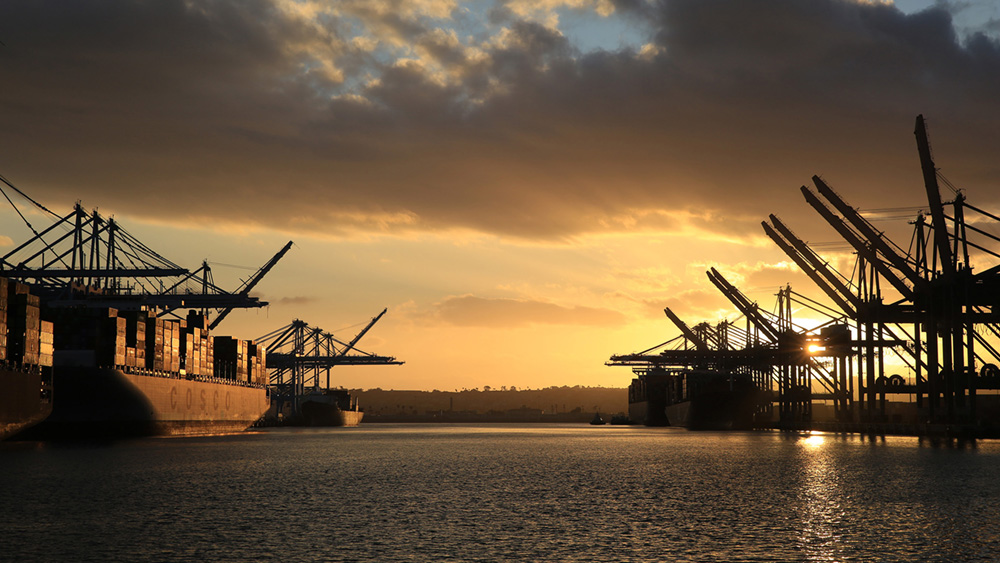By Gordon Feller

An important case study published by the U.S. Environmental Protection Agency is focused on the ports of Los Angeles and Long Beach. The research aimed to assess their community engagement on reducing emissions and setting a goal of zero-emissions for trucks and cargo equipment at the ports. It also examined what impact their activities could have with regard to encouraging other ports to follow suit.
“The Ports of Los Angeles and Long Beach have taken important steps to work with local stakeholders in the community to reduce diesel emissions. They should be applauded for those efforts,” Congresswoman Nanette Diaz Barragán (D-CA) said. “Still, the extremely high rates of cancer, asthma and other respiratory illnesses in the communities around the ports shows we have a long way to go.”
Barragán represents California’s 44th Congressional District, which includes the communities of Carson, Compton, Florence-Firestone, Lynwood, North Long Beach, Rancho Dominguez, San Pedro, South Gate, Walnut Park, Watts, Willowbrook and Wilmington.
Community-based critics of both ports, and of the EPA, say that there’s a great deal of work still to do to meet the goals laid out in the “Clean Air Action Plan” published in 2017 by the Los Angeles and Long Beach ports. One important necessity to reach these goals – in Southern California and across the country – is federal support for ports to quickly deploy new zero-emissions technology. This is why Barragán introduced the “Climate Smart Ports Act” to provide federal investment in zero-emissions equipment at America’s ports. The goal is to improve air quality and create good jobs in port communities across the U.S.
Barragán says that “there are billions of dollars in investment for greening ports in President Biden’s American Jobs Plan. It’s a great start. The need is even greater. I’ll be pushing for as much investment as possible to clean up our ports and reduce the burden of pollution on frontline communities in my district and across the country.”
Nearly 40% of Americans live within three miles of a port. Advocates for change say that reducing toxic emissions in their air is not a ‘nice to have,’ but a ‘must have.’
“In many ways, the Port of Los Angeles is the heartbeat of my district,” said Barragán. “Ports are job creators, but also major sources of air pollution with serious public health consequences, particularly for the communities of color that tend to live nearby. The people in these neighborhoods live close to working diesel trucks, ships, trains, and cargo-handling equipment spewing poisons into our air and water. And we’ve paid the price. By greening our ports, we can tackle this environmental injustice.”
If passed in its current form, the Climate Smart Ports Act would create a $1 billion-a-year zero-emissions ports infrastructure program to assist ports and port users. It would also create the first federal program dedicated to greening our nation’s ports and reducing the toxic pollution that severely harms the health of people in port communities.
Additionally, the Climate Smart Ports Act would invest in zero-emissions technology and infrastructure, protect dockworkers, fight climate change, address a source of environmental injustice, and create good-paying green jobs, according to its proponents.
The bill would authorize and fund new initiatives in each of the following areas:
Replacing diesel-burning cargo handling equipment, port harbor craft, drayage trucks, and other equipment with zero emissions equipment and technology;
Installing shore power for docked ships, and electric charging stations for vehicles and cargo equipment;
Developing clean energy microgrids onsite at the ports to power their facilities;
Authorizing an additional $50 million a year for the Diesel Emissions Reduction Act, specifically for reducing emissions at ports.
Implementing strong labor provisions to protect dockworkers from automation, require a prevailing wage for installation work generated through grants, and encourage the use of union labor and local hiring.
When Barragán reintroduced the bill in January, 2021 she stated that people are often given a false choice between a clean environment and a strong economy, but with the Climate Smart Ports Act, no choice is necessary.
In February, a companion bill was introduced in the U.S. Senate by Sen. Jeff Merkley (D-Ore.). As of mid-July, it is still pending at the committee level.
